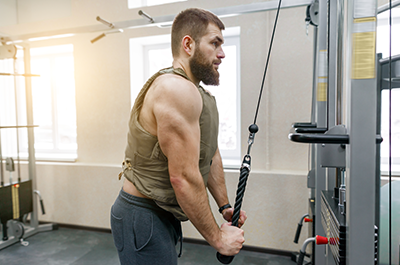When your muscles are overworked and in need of some tender loving care, it’s not uncommon to seek comfort and healing in cold or hot treatments. In fact, for centuries doctors have been using extreme temperatures to ease pain and speed recovery.
Which temp is best for your particular needs? Maybe both!
Cold Case: What to Know About Cryotherapy
For years, doctors have turned to ice packs, cold compresses and ice baths to reduce inflammation, ease pain and hasten recovery. The term “cryotherapy” is really just a fancy word for applying cold. It can range from the simple (an ice bath or cold water submersion) to the complex (nitrogen chambers). The latter is gaining traction in the fitness world for its reported ability to get athletes back on the field quickly.
During nitrogen cryotherapy treatment, gaseous nitrogen circulates around your body cooling the skin and triggering your cold receptors. “You walk into a cryotherapy booth and hang out for three to five minutes with your head above the chamber,” explains Rebecca Kurtz, M.S., an exercise physiologist at Henry Ford Health.
Regardless of whether you step into a cryotherapy chamber, there are several perks to any cold therapy:
- Cold can reduce inflammation. Inflammation is a natural component of exercise, training and recovery. But if you overdo it, excess inflammation can lead to an overuse injury. Cryotherapy can help stop that process in its tracks. The end result: Less inflammation and a lower risk of muscle soreness and injury.
- Cold can treat existing injuries. Applying ice to an acute injury (like a sprained ankle, for example), can help reduce swelling and inflammation and speed recovery time.
- Cryotherapy is not for everyone. While all forms of cold therapy are generally considered safe, cryotherapy chambers and liquid nitrogen therapies are not appropriate for people who have high blood pressure, heart conditions, certain autoimmune conditions, or children and pregnant women.
Hot Topic: What to Know About Heat Therapy
On the other end of the spectrum, most people associate heat with relaxation. And whether you soak in a hot tub, sit in a sauna or apply a heating pad to achy muscles, hot temperatures may actually help sore muscle fibers. Three reasons to turn on the heat:
- Heat relaxes muscles. “While icy temperatures help reduce inflammation, heat helps dilate blood vessels and promotes blood flow,” Kurtz says. If your muscle is spasming, heat is best.
- Heat may help athletes. Some athletes use saunas to acclimate to hotter temperatures if they’ll be competing or participating in an event in a hot climate. They may also use a traditional heat sauna or an infrared sauna (which uses light to create a heat chamber similar to liquid nitrogen cryotherapy chambers) to loosen muscles after a workout, but the jury is out on whether this actually helps. “There is very limited research behind using either a sauna or infrared sauna for post-workout recovery,” Kurtz says. “It probably won’t hurt you, but it may not help.”
- Heat requires hydration. The most important thing to remember if you choose to use a sauna or infrared sauna is to hydrate. You may already be slightly dehydrated from your workout and the temperature of the sauna can cause you to lose even more water.
If you have an injury or inflammation, steer clear of heat therapy for at least two to three days. “After the acute phase of the injury, you can use heat to help with recovery and relax muscles,” Kurtz says. “A heat pack or submersion in a hot tub may help with muscle strains and promoting range of motion.”
Still, your best bet to promote recovery after a workout are the tried and true solutions: get good sleep, eat a healthy diet (including a proper recovery meal with carbohydrates and protein) and rehydrate after you work out.
For a comprehensive analysis of your fitness and athletic performance, call the Henry Ford Human Performance Clinic at (313) 972-4030.
Rebecca Kurtz is an exercise physiologist who sees patients and athletes at the William Clay Ford Center for Athletic Medicine in Detroit.



